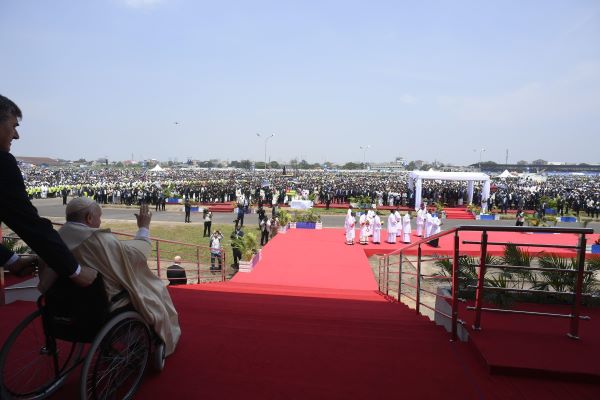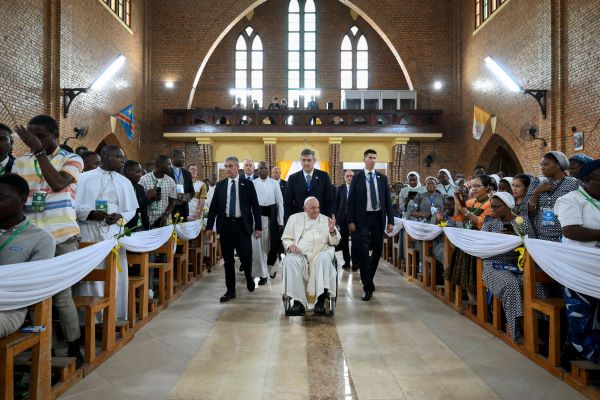Taking a stand against corruption, maintaining an active prayer life and overcoming the temptation to worldly comfort were Pope Francis’s key messages to the Church on his last full day in the Democratic Republic of Congo.
Francis emphasised his anti-corruption message during an exuberant gathering of around 65,000 young people and catechists at the Stade de Martyrs in Kinshasa.
The entrance of Francis in his popemobile electrified the crowd, who waved and sang a welcome song as music blared out through speakers.
The Pope’s remarks calling for an end to the “spread of corruption” drew loud cheers and applause before a chant broke out in the local Lingala language that Congo’s President Felix Tshisekedi’s mandate was “over”.
President Tshisekedi, who is up for re-election in December, was supposed to mark a clean break with the 18-year presidency of Joseph Kabila, reportedly under investigation for embezzling $138 million. But critics say Tshisekedi has not done enough to improve the lives of the people in the country.
In 2020 a Congolese court found a senior aide to the president guilty of embezzling $50 million (£39 million) of public funds.
Corruption remains a huge underlying problem for Congo, where outside interests exploit its abundant natural resources while most of the population lives in grinding poverty. Yesterday, Francis yesterday denounced groups who are fuelling conflict in the country while enriching themselves.
“We have the freedom to choose. Do not let your life be dragged along by the current of corruption,” the Pope told the young people.
“If someone offers you a bribe, or promises you favours and lots of money, do not fall into the trap. Do not be deceived – do not be sucked into the swamp of evil.”
The Church in Congo has taken a leading role in trying to build up civil society, ensure free elections and tackle corruption.
Fr Giulio Albanese, an Italian missionary who has worked in Sub-Saharan Africa for years, told The Tablet that the war in Congo was essentially being waged against “civil society” given the country's exploitation for economic gain.
“The Church has become the field where civil society is growing,” he said.
“It shows that to be a good Catholic is to be a good citizen.”
Fr Albanese pointed to the legacy of two Congolese bishops who were two outspoken advocates for human rights and civil society: Archbishop Emmanuel Kataliko (1932-2000) and Archbishop Christophe Munzihirwa Mwene Ngabo, a Jesuit who was assassinated in 1996 and called the “Oscar Romero of the Congo”.
More recently, the Church was closely involved in the 2016 St Sylvester peace accords, which sought to resolve a political, constitutional and social crisis and to help form a government.
The Pope’s speech at the youth meeting emphasised building community, forgiveness and personal prayer.
He said Christ should not be seen as a “far-off being”, but a “best friend” and that prayer allows God to intervene in their lives powerfully.
“That power has a name. Do you know who it is? It is the Holy Spirit, the Comforter, the Giver of life. The Holy Spirit is the driving force of peace, the true power of peace,” Francis said.
The Pope was energised by the crowd, egging the young people on and at one point got them to hold hands as a sign of community.
He resumed his theme of the dangers of money when he met with priests, deacons, religious and seminarians in the Cathedral of Our Lady of the Congo. The cathedral was built in 1947 and is the mother church of the Archdiocese of Kinshasa.
Francis warned the assembled clergy not to give into the temptation of worldly comfort.
“Ours is not a profession, or social position, or a means of providing for our families at home,” Francis told the clergy and religious.
“It is sad when we turn in on ourselves and become cold bureaucrats of the spirit. Instead of serving the Gospel, we then become concerned with managing finances and pursuing some profitable business for ourselves.
“It is scandalous when this happens in the life of a priest or religious, for they should instead be models of sobriety and inner freedom.”
The Jesuit Pope said there can be no compromises with money and urged the 1,200 present to embrace poverty and live celibacy “as a sign of complete availability to the kingdom of God!”
Before speaking, Francis heard the testimony of Sister Alice Sala, who said that the 86-year-old Pope had followed the model of the Good Samaritan by coming “to the aid of a people forgotten on the international stage” when so many “come to plunder our wealth and leave us half dead on the way”.
It was, she added, an example of “fraternity and synodality”.
Divin Mukama, a seminarian, then spoke about the phenomenon of revivalist Pentecostal Churches in Congo, which he said has sparked a crisis of Catholic identity. He concluded by pledging his commitment to building a “synodal Church.”
The Pope told priests and religious that the “secret of everything is prayer”, emphasising the importance of the daily celebration of the Eucharist and the breviary.
But he explained that the “rote recitation” of prayers is not enough and time must be spent “heart to heart” with God, even amid activity.
Prayer, Francis said, helps to overcome “spiritual mediocrity.”
Francis later insisted that the ongoing “formation” of the clergy is not an optional extra and that it is possible to overcome “rigidity” and “not remain entrenched in one’s own ideas and positions”.
Francis’ words on formation are significant in light of the resistance to his synodal reforms seen among certain younger clergy.
Tomorrow morning the Pope will meet with the Congo’s bishops before boarding the plane to South Sudan for the second leg of his Africa trip.
When he arrives in Juba, the Archbishop of Canterbury and the Moderator of the Church of Scotland’s General Assembly will board the papal plane to greet Francis.
The three Church leaders will begin a historic ecumenical pilgrimage for peace in the world’s youngest country from 3-5 February.
Christopher Lamb, The Tablet’s Rome Correspondent, is among the journalists travelling with Pope Francis and is filing regular reports on the papal visit to Africa.



 Loading ...
Loading ...